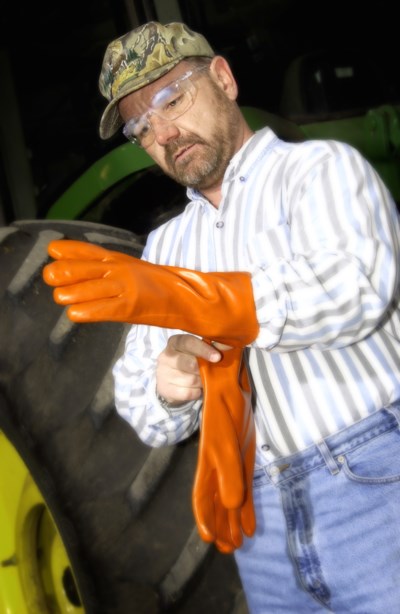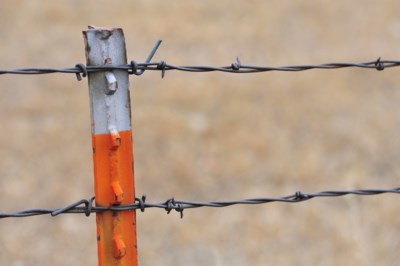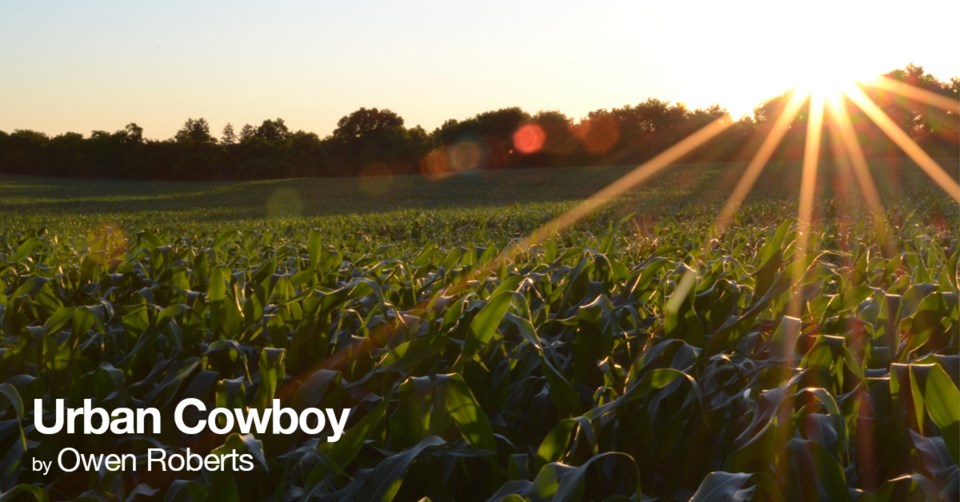Really, you can’t have one without the other. If farmers aren’t safe on their own farms producing food for the rest of us, the food supply itself is in jeopardy.
The consequences of that scenario speak for themselves, particularly during a time when the population is growing, we’re looking for ways to feed nine billion. We need farmers to produce more, not less.
And we need to encourage people to consider becoming part of the agricultural industry. I’d hazard a guess that such a consideration is more likely if the sector is seen taking measures to promote safety.
 A farmer pulls on a pair of gloves in this stock image.
A farmer pulls on a pair of gloves in this stock image.But how does safety happen on the farm, anyway?
Well, it’s a combination of several factors. It starts with farmers’ own mindset, and their determination to run a safe operation, for them and their families. That means having respect for equipment, technology, livestock, crop protection, weather, transportation and everything else that poses a potential safety problem.
Farm safety is also a product of education. Farming is an increasingly complicated occupation and safety training needs to keep in step. Ongoing efforts across the provinces promote farm safety, with training workshops and other programs aligned with Canadian Agricultural Safety Week in March.
But while certain farm safety practices are mandated, such as the safe handling of pesticides, farm safety per se is not. And frankly, many farmers are fine with that.
Certainly, they don’t want to put themselves or their families in harm’s way.
But likewise, they don’t want bureaucrats or legislators telling them what constitutes a safe farm, and how to run it. They think they have enough of that already, particularly with some environmental regulations they consider uninformed and unfair. All farmers live by the Agriculture More Than Ever credo: my business, my passion, my life.
Introducing regulations into that kind of a mix is not easy.
However, some farm safety proponents are edging towards a happy medium, based on leadership rather than legislation.
They were listening intently when newly minted Prime Minister Justin Trudeau alluded to safe food production in his mandate letter last fall to federal agriculture and agri-food minister Lawrence MacAuley.
The mention was brief, but present, at least.
“You will implement our government’s plan to help Canada’s agriculture sector be more innovative, safer and stronger,” said the Prime Minister. “Canada’s farmers, ranchers and food processors are the foundation of our food sector. Government must use its policy and financial tools to support the agricultural sector in its vital work.”
Now, an organization called the Canadian Agricultural Safety Association (CASA) wants Ottawa, the provinces and territories to ante up and take the lead in making farm safety a part of a huge funding and policy program called Growing Forward. Its next iteration doesn’t launch for two years, but during this, the consultation process, politicking is in full swing.
The association calls itself is a national, non-profit organization dedicated to improving the health and safety of farmers, their families and agricultural workers. It liaises with provincial and local farm safety champions to reach individual farmers and farm families and help them see and manage risk. And it wants Ottawa to take the lead in creating a pro-farm safety environment.
 Barbed wire.
Barbed wire.“The Prime Minister, in the mandate letter to the Minister of Agriculture, stressed the importance of a safe agriculture sector. We are encouraged by this language and hope to see farm safety highlighted in the new agricultural policy framework,” it says.
The association has partnered with the Canadian Federation of Agriculture and drawn up some key recommendations. These include ensuring that gaps in improving farm safety are addressed, through funding a national organization (in other words, CASA), and maintaining a focus on regional organizations to conduct more specific and localized work.
As well, they want farm safety recognized as a research priority, and want Ottawa to reintroduce cost shared on-farm safety investments for critical safety equipment.
It’s hard to imagine a government saying no to farm safety. But when it says yes, farmers will need to accept it as some kind of a partner. There’s a delicate relationship, indeed.
